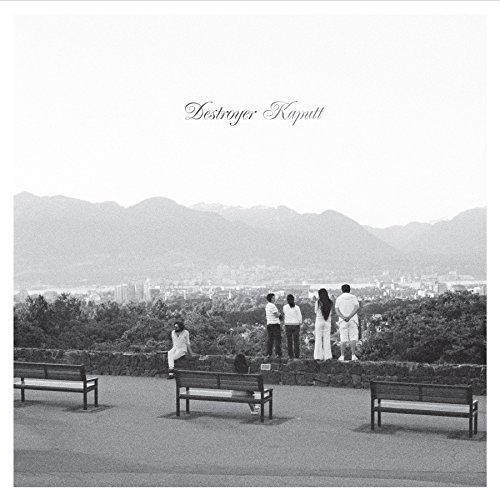
Destroyer
Have We Met
Release Date: Jan 31, 2020
Genre(s): Pop/Rock, Alternative/Indie Rock
Record label: Merge
Music Critic Score
How the Music Critic Score works
Buy Have We Met from Amazon
Album Review: Have We Met by Destroyer
Very Good, Based on 10 Critics
Based on rating 8.5/10
David Bowie 's thirteenth studio album, Lodger, is the ultimate 'connoisseur' record, because it represents the culmination of everything he'd been working on up until that point in his career. He'd spent more than a decade switching between styles, and on Lodger he demonstrated that he was willing to mix styles he'd mastered almost a decade before with styles he'd never even tried. It's possible to say now, with some certainty, that Lodger is one of David Bowie's finest records.
Based on rating 4/5
Rating: NNNN When Destroyer's Dan Bejar originally conceived of Have We Met, he imagined sounds that conjured the Y2K era, that anxiety-laden period of people worrying modern society would crumble because of a computer error. As he started writing and tinkering with MIDI instrumentation on GarageBand though, that grand abstract concept loosened and evolved into the more straightforward ambition of making "computer music. " To produce that effect, he enlisted his longtime Destroyer producer and New Pornographers bandmate John Collins, who in turn layered synths, drum machines, keyboards, disparate soundscapes and guitars from another frequent Destroyer collaborator, Nicholas Bragg.
Based on rating 8/10
Crimson Tide; a 1995 blockbuster drama somewhat inspired by the Cuban Missile Crisis, perhaps inspires the name, if nothing else, for the opening track of Destroyer's 12th album Have We Met. Why exactly, as with most things Dan Bejar, remains a mystery. One listen to "Crimson Tide" (the song)— a six minute surrealist romp through Bejar's stream of consciousness— will tell you that he remains obsessed with characters who are down on their luck.
Based on rating 7/10
Dan Bejar has conjured a vocal personality for himself that's so arch and mannered it's hard not to wonder if he's aware of just how witty he is. Of course, a guy who comes up with titles like "The Television Music Supervisor," "The Man in Black's Blues," or "Cue Synthesizer" is tipping his hand to the fact that at least a little of his tongue is in his cheek. The tug between the melodramatic sweep of Bejar's music and the darkly acidic snark of his lyrics and vocals is half of the fun of Bejar's 11th album under the banner Destroyer, 2020's Have We Met.
Based on rating 7/10
Dan Bejar was flirting with disaster when he began writing the latest Destroyer record. Originally conceived as a Y2K throwback, Have We Met lost its high-concept hook as longtime collaborator John Collins fleshed out Bejar's demos. Aside from a trip-hop pulse on "Kinda Dark," the finished product bears little resemblance to music at the turn of the millennium. It does, however, retain the faint menace of a time when a coding error could end the world as we know it. Alluding to everything from the Boston Strangler to an unnamed group ….
Based on rating 3
Remember that time when that guy called Luke played a piano in the park to try and win back his ex-girlfriend? Then had to stop because he got punched in the head, and it turned out they'd only been together for like four months anyway? And she really wasn't impressed? Ok, so imagine that Luke got older and older, more Canadian, and someone nicked his piano, so he had to play his synthesiser instead. You'll now be in the right state of mind for Destroyer‘s Have We Met. That's not so say that the 13th studio album from Dan Bejar and his revolving band of merry musicians isn't very good.
Based on rating 3/5
Dan Bejar is a man constantly spinning through time. A musician of all eras and of none. A paradox if ever there were one, even right down to the name of his project: Destroyer. If you go in knowing nothing, you're probably expecting something that's all angles and sharp edges. Not the crooning of ….
Opinion: Excellent
The Lowdown: Dan Bejar has a good relationship with his unconscious. He's something of a surrealist, and he's at least as interested in the sounds of words as their literal meanings. On Destroyer's twelfth studio album, Have We Met, this inclination is as apparent as ever from the outset. Before trying to piece together perceived allegories out of the many abstract lines on the opening track, "Crimson Tide", keep in mind that the song is itself a collage.
Opinion: Excellent
"Did you realize it was hollow, like everything that's come before you are gone? The idiot's dissonant roar, that exquisite gong struck down Cue synthesizer, cue guitar, bring in the drums, cue fake drums. " If you had to distill Daniel Bejar's quarter-century of hyper-articulate, dystopic crooning into a single song, you could do worse that "Cue Synthesizer," the second single from his 12th full-length album. Against a hard but minimal funk background—shocking slap of drum, disruptive buzzing bass, anarchic, seesawing guitar solo just offstage—Bejar finds a cool, unruffled place to stand, a place from which the most desolate views can be expressed in the most arch and artful ways.
Opinion: Excellent
I t's not intended as snark or faint praise when I describe Destroyer as very much an acquired taste. It's more a statement of fact. Singer-songwriter Dan Bejar, who more or less is Destroyer, has a hefty cult following, who have accompanied him through the series of baffling stylistic shifts that have constituted Destroyer's career to date: come for the abstruse lo-fi racket of We'll Build Them a Golden Bridge, stay for the 13-minute disco workout on Bay of Pigs, or the ambient collaboration with Tim Hecker, Archer on the Beach.
'Have We Met'
is available now

